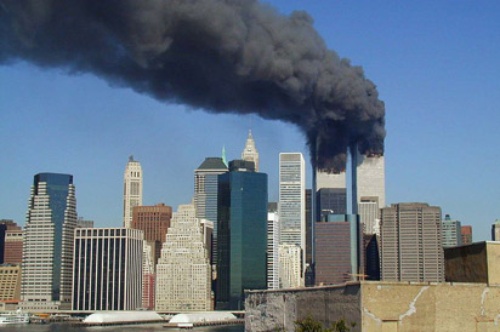
An Outsider in Post-9/11 New York
Can anyone else truly understand what New Yorkers have been through?
Photograph by Michael Foran.
I've lived in New York for four months, but I act like I've lived here my whole life. I can correctly say the names of streets that are pronounced nothing like they're spelled. I ignore traffic lights. I walk too quickly down Broadway, as if the tourists are the worst thing about my entire day, and on the subway—even when I'm lost—I pretend to know where I'm going.
But part of moving to New York anytime after September 11, 2001 is sharing the memory of that day with the people who lived here at the time: the real New Yorkers. These are the people who had their homes and offices evacuated, who watched clouds of smoke blacken the air around lower Manhattan, who adjusted to looking at a changed skyline when the dust and soot finally cleared. I didn't witness any of this, save for what played on the clunky television my grade-ten civics teacher wheeled into our classroom. None of my peers, myself included, knew what the World Trade Center was. We didn't learn about the Twin Towers until after they came down. My classmates and I shared in our confusion, but now, I feel like I'm the only one who can't relate. My hometown was never the victim of any kind of violent political attack, but my chosen city was, long before I moved here.
Rhett Miller's recollection of 9/11 in this month's Atlantic recounts the horror of living downtown during the attack: scrubbing soot off your eyeballs; not caring at all for your life's possessions and leaving your apartment as quickly as possible; going into shock and fixing a bowl of cereal, unsure of what else to do. When I was nineteen, I escaped the burning-down of my childhood home. That's a world apart from a coordinated terrorist attack, from three thousand dead, from fleeing a massive skyscraper as it smolders and falls. There's no comparison. But the small details—the smoke, the cereal—resonate with me. When I hear people talk about their post-9/11 psychological traumas, I want to put my hand on their shoulders and tell them I know a great sleeping pill, that the nightmares will stop if they exercise more and stop eating fast food, which are really just things that therapists say when they know that nightmares can go on forever.
In the weeks leading up to September 11, 2011, there is a mood of dread and inevitability in the Manhattan air. TV commercials are promising primetime specials, commemorating the attacks a decade later. There are posters on the subway advertising George W. Bush's highly anticipated National Geographic interview about the attacks. Security is getting tighter. Police are doubling up around Ground Zero. New York is marching toward an anniversary that recalls a day of terror and disillusionment, and I can only quietly watch from the sidelines. I know what it's like to narrowly escape a crumbling building, but I have no idea what it's like to live in a crumbling, frightened city.
On the L train, a man in a suit pointed his iPhone toward the poster advertising Bush's then-pending interview. "Can't believe it's been a frigging decade," he said to me, in a failed attempt to commiserate. "And we still don't really know what happened that day." I widen my eyes, nod my head.
I, too, have questions of my own, but they're different. Like: "Why has it taken so long to start rebuilding this site when entire subdivisions can go up in a week?" and "Why did people who were twelve on 9/11 flock to Ground Zero after bin Laden was killed, just to toss beach balls back and forth and chant 'U-S-A! U-S-A!'?" I keep these questions to myself. The things I wonder now are the same things I've always wondered, and the place I'm in now is the closest I've ever felt to home. But the people I live with endured this hellish thing that I didn't. This is why I cannot be a true New Yorker.
9/11 is a firsthand recollection that I do not have and do not want. As the New Yorkers around me prepare to mourn and remember, I walk among them, thinking of the dawn in which I left my own home in horror, and the morning I spent scrubbing the soot out of my eyes in a neighbour's bathroom. This is my attempt to understand. It's not the same thing, but it's the best I can do.
Subscribe to Maisonneuve today.
Related on maisonneuve.org
—Martyrdom and 9/11
—9/11, New York Music and Cultural Memory
—They Never Told Us These Things
Follow Maisonneuve on Twitter — Like Maisonneuve on Facebook





